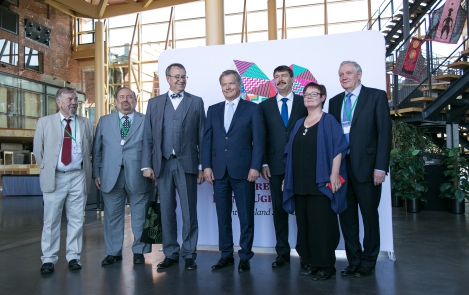-
Reset
+


President Ilves: the unique singularity of indigenous people should be their pride and provide them dignity; it is the common wealth of us all
15.06.2016
The President, Toomas Hendrik Ilves, who spoke at the 7th World Congress of the Finno-Ugric Peoples, introduced the story of maintaining the Seto and the Liv peoples to the audience. He invited everyone to make a conceptual trip from Lahti across the Gulf of Finland to the southeast corner of Estonia by the Russian border, where the village of Obinitsa with fewer than 150 people was last year the cultural capital of millions of Finno-Ugric peoples.
"This shows how something small can actually be something great," said the Estonian Head of State and added that the dedication and tenacity of the Setos could be a compass for us all, showing us how to make sure that a special culture survives difficult times and inevitably changes and that, in addition to their own will, they also have the support and understanding of the Estonian state.
"Moving south somewhat we see how, with the help of kindred peoples and the Latvian state, the culture of the Livs is making a comeback, from the edge of extinction, and becoming revitalised," President Ilves continued.
"What we must talk about here is the survival and development of the Finno-Ugric world. This involves much more than just recording and preserving folk culture. It involves those who are larger providing support, assistance and confidence in order to help those who are smaller become great," he addressed the World Congress of the Finno-Ugric Peoples.
President Ilves described free and democratic societies that support projects essential for the preservation of diverse cultures as the strength of the free world; they support diversity to ensure that the languages and cultures of the smallest nations survive.
He also spoke about concerns related to the decline in the populations of the Finno-Ugric peoples in Russia and the number of speakers of Finno-Ugric languages, stating that this is related to our own identity; an identity that would be much poorer without the Finno-Ugric peoples in Russia.
Imagine the voids that would be left with if we excised Lennart Meri's films, Veljo Tormis's music or Kaljo Põllu's graphic art from our culture. They all are based on the cultural heritage of the Finno-Ugric peoples in Russia, said President Ilves and added: "Therefore, these peoples help us to we support ourselves, our own linguistic and cultural space. We support the cultural richness and diversity of the entire world."
The small and unique Finno-Ugric and Samoyed peoples need to be protected and supported by those who are larger; they are the last ones left and the disappearance of languages, against the background of developing raw-material-based economies and conflicts between the fragments of unique peoples and large industrial enterprises, must not be seen as an acceptable norm in the 21st century, that we must silently reconcile ourselves to, stated the Estonian Head of State.
"Someone's financial profit must not outweigh the loss of languages and cultures, because this destroys something in all of us. We, along with the rest of humankind, become poorer," he said.
"The Finno-Ugric peoples who have their own states are obligated to support our smaller kindred peoples," said President Ilves. "Thus, I am very pleased about the initiative for a Forum of Finno-Ugric Villages, which will provide support to our kindred peoples and promote our cooperation."
He was also happy to forward an idea from Tarmo Soomere, the President of the Estonian Academy of Sciences, which could help Finno-Ugric linguists that write in Russian to make the results of their research work available to the global academic community, by translating them into English and publishing them in the journal Linguistica Uralica. However, this also assumes cooperation between our countries.
President Ilves recalled that a little more than a hundred days are left before the 107-year-old Estonian National Museum opens the doors to its splendid new home in Tartu – its first true home. The steadfast traditions of the Estonian National Museum have also included collecting, researching and promoting the cultures of our linguistic kin. This will now be done at a totally new level – the permanent exhibition devoted to the Finno-Ugric peoples will spread across 1,100 square metres.
This exhibition is an anchor, around which the life of the Finno-Ugric peoples can live and bubble. An embassy for all the small Finno-Ugric peoples is being born in Tartu, commented the Estonian Head of State.
Office of the President
Public Relations Department




